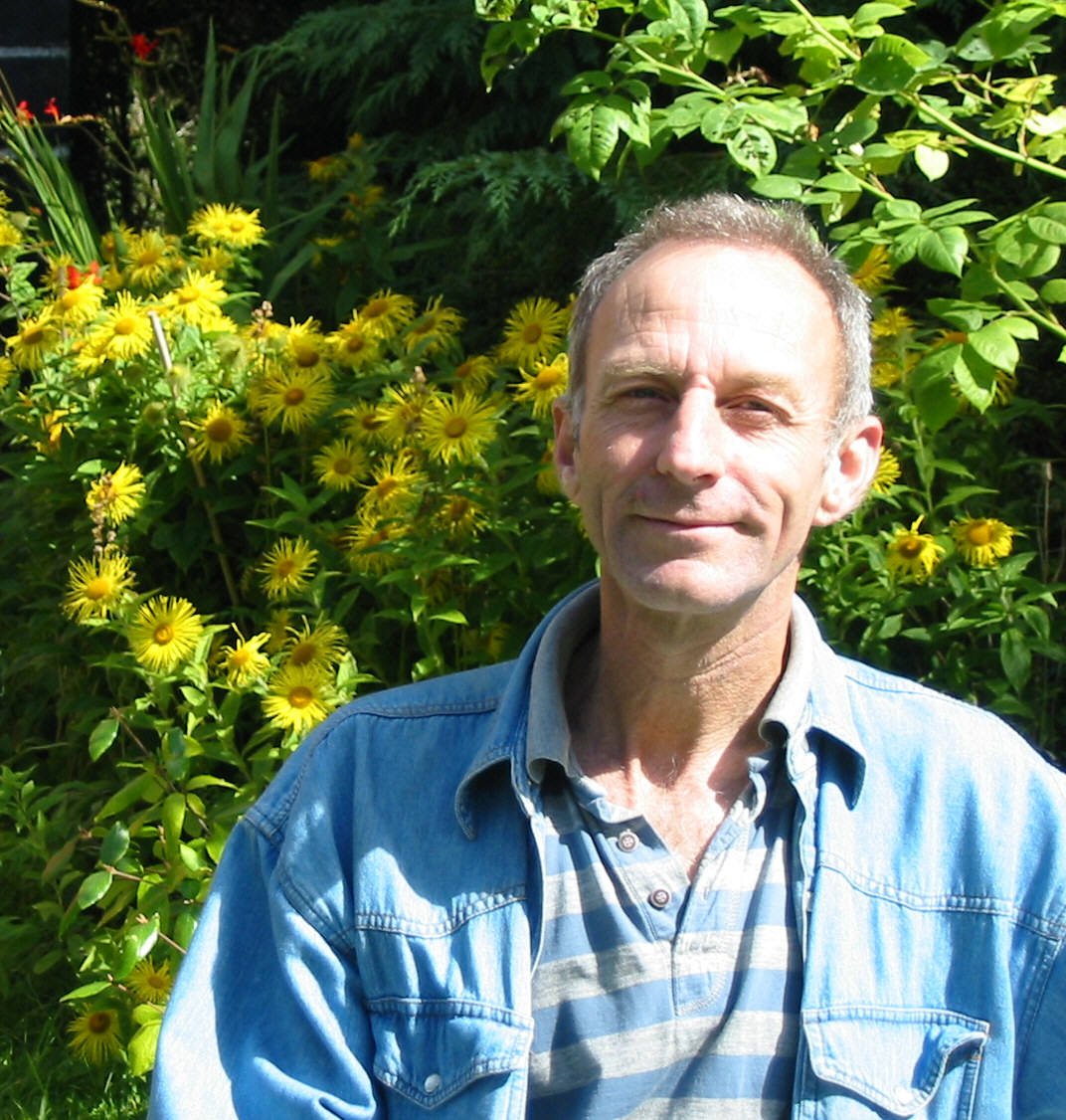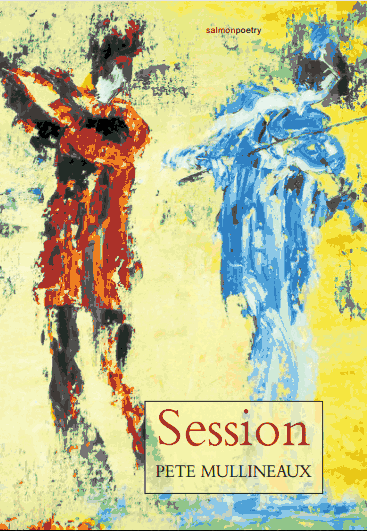Raftery’s Buttons
Raftery, blind poet and fiddler
negotiating the rough back roads
of Galway-Mayo, stumbling
over fallen trees, circumnavigating
lethal drains and ruts, raging
against rivals, the status quo
and all who had crossed him –
according to legend
composed himself
by mapping out tunes
on his waistcoat buttons;
sharpened his wits
flattened the humps and dips,
bum-notes of hidden pot-holes,
the curse of a thousand
cuts and sprains
with a steadying rhythm;
staved off the elements,
mellowed cares,
re-jigging old scores
wild ramblings
into sweet strains
and settled airs.
A Piper Prepares
It’s almost like shooting up: a captivating ritual –
the belt looped around the forearm; buckle
notched, blowpipe joined to leather bag; a shard
of cloth folded between elbow and rib for comfort –
trusted talisman, guardian against the unknown
and unnamed – keys, bars with no endings. Drones
are attached like pistol silencers, regulators poised –
and now, the popping strap – the ‘piper’s apron’
a leather patch, spread across the thigh; you’d think
for protection from the crazed jabs of the chanter,
its manic hypodermic dance. In fact, the placing there
will cause a glottal stop, suspension of sound, a near –
death, allowing trap-door drop, down the pit-shaft
of the octave to low D: belly-forge, base underworld
from where a primal hum vibrates, connects –
fixes on the spinal cord, sends a hit exploding
into the skull’s chamber. The head reels, a gasp
for air as the bellows fill and suddenly there’s life
in the lungs and wind in the reeds, escape – we’re
up and away – tripping over the scales, flying
above the Walls of Limerick, the never ending
Siege of Ennis – hello and goodbye to Rocky Road,
Wheels of the World, Hills and spills of Donegal –
heading towards that high high doh…
A Slow Start to the Set
All materials are alive –
at least in the sense they
have potential to make sound.
Metals ring, while woods vibrate,
put them together you have
guitars and violins –
inside of which, the tunes are
only sleeping…
Music of the Spheres
Hard to imagine a universe without sound –
why else call it the Big Bang?
From background noise to formal structure:
Sibelius heard chords reverberating in a forest,
while Kepler, pursuing the Pythagorean string
combined geometry with harmonic intervals,
finding spaces between the planets
relative to fourths and fifths.
As much as we are made of cells and atoms
molecules and ever exotic sub-particles,
matter is alive with waves and pattern of vibration,
some only the dog, bat or dolphin, can detect;
all things have their sympathetic note –
there is tone and pitch in a blade of grass
a lump of coal. Water crystals change shape
and distort in response to varied frequencies
of voiced emotions – there is hurt
and healing in it.
And we too are so much water.
Concertina
She shuffles it like a pack of cards,
testing the silent breath in the pleats.
With the air button pressed, fingers tease
but the instrument stays mute –
if push came to shove, you could play
this way all day, under the table,
hands coming together, moving apart
never quite meeting; like almost clapping –
nothing strange then in a concertina sounding jolly
while the player’s expression
is so often grave, giving little away
of what lies beneath.
Requiem
The cows have gathered in an adjacent field,
I can see their shapes in the moonlight –
a meeting of the tribes, they are here in their multiplicity;
black, brown, black and white – some all white,
like ghosts, or recent converts.
Just now I heard a moan from one of them
that had me awake as if I had been shot.
It’s the night before their calves are taken,
they know from the look in the farmer’s eyes.
They call him by name
although it sounds like ‘moo’ to us.
I listen at the window to their keening –
we make recordings of whales and dolphins,
say they are a higher species
as close to us as nature gets –
but the cows are singing in their camp,
refusing to be cattle
marking their loss
celebrating the grass
thanking the rain.
The females, even the males most of the time
are gentle, considerate, abiding.
But tonight the cows have run out of patience,
can ruminate no longer; they sing
their mass; make ready for battle,
tomorrow they will paint themselves red –
attack.
Tonight’s the Night
I took Dad to see Neil Young; he wore his suit (Dad, that is –
Neil Young wore a tie-dye shirt.)
1975 (I think) Bristol Colston Hall: crazy Neil with Crazy Horse.
And crazy me for bringing Dad
but he’d taken me to Cheddar Caves, Castle Coombe, and over
on the ferry to South Wales –
(again, Dad, not Neil Young, who hadn’t take me anywhere, yet.)
So I wanted to show him something,
even though his taste in music began and ended with Bing Crosby;
(definitely Dad, not Neil Young
whose influences would be more blues, roots country
and rock and roll.)
And he was cross: (Neil, this time; my dad was surprisingly
mellow, if somewhat conspicuous.)
They started with a brand new song called Tonight’s the Night
which the audience heckled
wanting more familiar tunes like Southern Man, Helpless
and Cowgirl in the Sand.
But Neil was having none of it – he gave us all a lecture:
how this was about someone
real close to him, a roadie who had died from drugs –
‘Bruce Berry was a working man…’
and sang it again, only more aggressive; which pissed
the audience off even more.
I was hoping Dad was OK, not feeling out of place
but he seemed to be taking it all in
even nodding his silver head through the deranged
twenty minute guitar solos.
Eventually there was a compromise: the band
won us over by doing all the old hits
but then, for an encore did Tonight’s the Night again.
I’ll never forget it –
afterwards, he bought me a takeaway, (Dad, not Neil Young)
don’t know what Neil and the band got up to
maybe they went back to the hotel
and talked about an old guy in the third from back row
who had smiled all through the concert,
and wondered what he was taking.
Whatever, I enjoyed myself too –
felt Dad and Neil
had got on well together.
‘Bruce Berry was a working man…’
 Pete Mullineaux grew up in Bristol, UK – where, aged 13 his poem ‘Harvest Festival’ was published in Poetry & Song by Macmillan and Man & His Senses (Harrap) then recorded on Argo records alongside music from Ewan MacColl & Peggy Seeger. Moving to London, he played with the left wing rock/punk band, The Resisters, before going solo as Pete Zero, doing music and poetry gigs from Trafalgar Square to Glastonbury, appearing alongside such luminaries as The Pogues. He appeared in Apples & Snake’s first anthology Raw & Biting Cabaret Poetry, won the City of London Poetry/song contest, toured a one man show: The Performers Fear of the Gong, (‘A Must!’ What’s On Magazine) and wrote for the Paul Merton fronted Comedy Wavelength (Channel 4). His first stage play, Wallflowers was presented by Kenneth Branagh’s Renaissance Theatre Co at the Riverside Studios in London. Alongside this he achieved a first class honours in Drama at Middlesex University. Pete has lived in Galway since 1991, working as a creative writing facilitator and drama devisor with numerous arts/community groups and is a mentor on Poetry Ireland’s writers in schools scheme. He’s resident MC for the Galway Arts Centre run Cuirt International Festival of Literature Poetry Grand Slam. Drama works include Trust Games, (commissioned by the National Association of Youth Theatres in 2010) Red Lorry Yellow Lorry, commissioned for the Cuirt International Festival of Literature. He’s also had three plays broadcast on Irish radio – most recently Butterfly Wings, in 2011. He has published three collections of poetry: Zen Traffic Lights (Lapwing 2005) A Father’s Day (Salmon Poetry 2008) & Session(Salmon 2011.) His work has been described by various reviewers as ‘tender and lyrical’, ‘gorgeously resonant’ and ‘grimly funny’ – drawing comparisons with Brian Patten & John Cooper-Clarke. Poems have been anthologised widely including Paul Muldoon’s Poetry Ireland Review 100, poetrydaily.com and about.com/poetry. He has also published Know Yourself Know the World – a drama resource for schools, centred on development themes within a sci-fi scenario, (Learning Horizons Educational Publishing, Dublin, 2004.) Pete has read at literary/arts festivals throughout Ireland, UK and also in New York. He was invited to address the 2008 Thomas Hardy Festival/conference in Dorchester, UK. Recent activities include devising a poetry encounter ‘Tipping the Scales’ which took place as part of the 2012 Babaro Children’s International Arts Festival and a long awaited return to Bristol for a reading at the 2013 Bristol Spring Poetry Festival.
Pete Mullineaux grew up in Bristol, UK – where, aged 13 his poem ‘Harvest Festival’ was published in Poetry & Song by Macmillan and Man & His Senses (Harrap) then recorded on Argo records alongside music from Ewan MacColl & Peggy Seeger. Moving to London, he played with the left wing rock/punk band, The Resisters, before going solo as Pete Zero, doing music and poetry gigs from Trafalgar Square to Glastonbury, appearing alongside such luminaries as The Pogues. He appeared in Apples & Snake’s first anthology Raw & Biting Cabaret Poetry, won the City of London Poetry/song contest, toured a one man show: The Performers Fear of the Gong, (‘A Must!’ What’s On Magazine) and wrote for the Paul Merton fronted Comedy Wavelength (Channel 4). His first stage play, Wallflowers was presented by Kenneth Branagh’s Renaissance Theatre Co at the Riverside Studios in London. Alongside this he achieved a first class honours in Drama at Middlesex University. Pete has lived in Galway since 1991, working as a creative writing facilitator and drama devisor with numerous arts/community groups and is a mentor on Poetry Ireland’s writers in schools scheme. He’s resident MC for the Galway Arts Centre run Cuirt International Festival of Literature Poetry Grand Slam. Drama works include Trust Games, (commissioned by the National Association of Youth Theatres in 2010) Red Lorry Yellow Lorry, commissioned for the Cuirt International Festival of Literature. He’s also had three plays broadcast on Irish radio – most recently Butterfly Wings, in 2011. He has published three collections of poetry: Zen Traffic Lights (Lapwing 2005) A Father’s Day (Salmon Poetry 2008) & Session(Salmon 2011.) His work has been described by various reviewers as ‘tender and lyrical’, ‘gorgeously resonant’ and ‘grimly funny’ – drawing comparisons with Brian Patten & John Cooper-Clarke. Poems have been anthologised widely including Paul Muldoon’s Poetry Ireland Review 100, poetrydaily.com and about.com/poetry. He has also published Know Yourself Know the World – a drama resource for schools, centred on development themes within a sci-fi scenario, (Learning Horizons Educational Publishing, Dublin, 2004.) Pete has read at literary/arts festivals throughout Ireland, UK and also in New York. He was invited to address the 2008 Thomas Hardy Festival/conference in Dorchester, UK. Recent activities include devising a poetry encounter ‘Tipping the Scales’ which took place as part of the 2012 Babaro Children’s International Arts Festival and a long awaited return to Bristol for a reading at the 2013 Bristol Spring Poetry Festival.
Pete’s latest collection Session is all about music and sound, with a particular focus on Irish Traditional Music. It has been praised by Martin Hayes, Siobhan Long (trad editor for the Irish Times) and Micheal O Suilleabhain – head of the World Academy of Irish Traditional Music in Limerick.
‘Session, brought out by Salmon Poetry in 2011 is a beautiful magical book, soaked in waves of musical imagery and sound…written with impeccable craftsmanship, a delight on the ear and begs to be read out loud.’ – The Ranting Beast.





